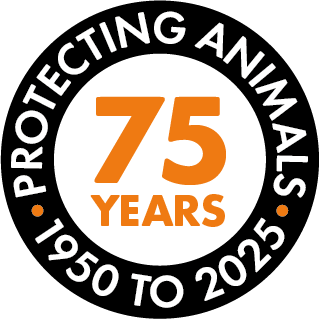Wildlife
Our campaigns
Wildlife has the right to a wild life, free from any form of cruel exploitation and thriving in natural habitat that is protected.

We’ve always moved wherever the need for animal protection is greatest. From opening our first shelter for abused animals in Costa Rica to supporting mobile veterinary clinics to treat horses and donkeys working in hot, harsh conditions in Colombia, Afghanistan, and Cambodia, we’ve responded to hundreds of disasters, helping millions of animals affected by floods, tornados, volcanic eruptions, wars, and more all around the world.
Today, we have 12 country offices and one international office, operating in more than 47 countries.


We’ve campaigned for lasting change for over seven decades. Our views are rooted in extensive research, and our opinions are published in reports covered by the global mainstream and influential media.
We carry out groundbreaking investigations, exposing some of the horrors animals experience at the hands of people. After six years of our campaigning work, India banned the trade in frogs’ legs in the 1980s, saving more than 30 million frogs annually.
In the 1990s, our Libearty campaign helped outlaw bear dancing in Greece, Turkey, and India. Today, we keep piling on the pressure to stop new factory farms, create a humane and sustainable food system, and end the exploitation of wild animals and give them the right to a wild life.




When you make a donation, you’ll join a passionate group of supporters who are determined to change the world for animals. We're fighting animal cruelty wherever we find it — are you with us?
DonateWe’ve moved international organisations to protect animals for many years. In the 1980s, we achieved consultative status with the United Nations and, by the 1990s, had been represented at the Council of Europe. These important platforms allow us to influence how animal welfare is viewed and legislated globally.
The UN Environment Assembly has officially recognised that animal welfare and the environment are inextricably linked. In 2005, the World Organization for Animal Health (OIE) adopted the first-ever global standards for farm animal welfare, ensuring 167 countries adopted guidelines on animal transportation and more humane slaughter methods.
By putting the welfare of farmed and wild animals on the agenda of these international organisations, we can have conversations that bring about the change that needs to happen at the highest level.



We have a rich and successful heritage of partnering with others and building coalitions that create lasting, systemic change. In the mid-2000s, our Pet Respect programme supported dog and cat sterilisation programmes worldwide, neutering around 20,000 - 30,000 strays yearly.
This work persuaded governments to stop using cruel methods of stray dog and cat control, such as poisoning, electrocution and shooting. Mass rabies dog vaccination programmes led to countries like Mexico officially eliminating rabies transmitted from dogs to humans in 2019.
In the 2010s, we brought together 80 member organisations for the Global Ghost Gear Initiative, which worked to stop abandoned fishing gear at sea, support new ways to remove it from our seas and help replicate successful local sea animal rescue efforts.

We work with others who share our values to raise the profile of animal welfare in everything we do. We will also challenge ourselves, our allies, and our opponents to do better, go one step further, and be as ambitious as possible to create the change we want to see.
Only by working together can we turn the tide.Though the challenge is immense, change is always possible. This is our story. Our supporters’ story. But most importantly, it’s their story.
Will you help write the next chapter? Join the next generation of animal protectors.
The World Federation for the Protection of Animals (WFPA) was founded with a focus on lobbying governments in Europe and Africa to improve animal welfare and increase overall awareness of the plight of animals.
The International Society for the Protection of Animals (ISPA) was formed. With links to the UK’s RSPCA, it focused on campaigning and animal rescue work mainly in Latin America, Europe, and Africa.
ISPA animal officer John Walsh rescued 10,000 animals from floodwaters in Suriname, laying the foundations of our disaster response work around the world.
WFPA and ISPA agreed to merge to become one major international animal protection organisation.
Following a six-year transition period, the merger of ISPA and WFPA was completed, and the World Society for the Protection of Animals (WSPA) was born.
We adopted a new logo symbolising our work and making our name more prominent.
We changed our name to World Animal Protection to clearly demonstrate our purpose, mission and what we stand for.
We launched our bold new 10-year strategy, which is focused on ensuring farmed animals live good lives and stopping the cruel exploitation of wild animals as commodities.

Our campaigns
Wildlife has the right to a wild life, free from any form of cruel exploitation and thriving in natural habitat that is protected.
Our campaigns
Working to ensure farmed animals live good lives by transforming the global food system & attitudes towards farm animal welfare.
Find out how you can support us in our work to move the world to protect animals both in the wild and commercial food systems. Take action now!